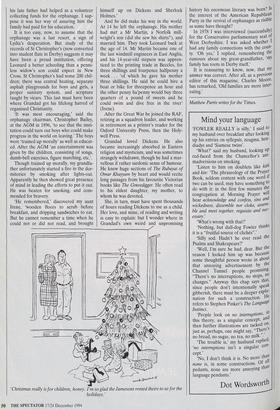Mind your language
`FOWLER REALLY is silly,' I said to my husband over breakfast after looking up his entries on syllepsis, zeugma, hen- diadys and 'Siamese twins'.
'What?' said my husband, looking tIP red-faced from the Chancellor's any madversions on smoking.
`Listen to him on doublets like kith and kin: The phraseology of the Prayer Book, seldom content with one word II two can be used, may have something to do with it: in the first few minutes the congregation at Morning Prayer will hear acknowledge and confess, sins and wickedness, dissemble nor cloke, assem- ble and meet together, requisite and nec- essary.'
`What's wrong with that?' `Nothing, but dull-dog Fowler thinks it is a "fruitful source of clichés".'
`Silly sod. Hadn't he ever read the Psalms and Shakespeare?'
`Well, I'm sure he had, dear. But the reason I looked him up was because some thoughtful person wrote in about that annoying advertisement by the Channel Tunnel people promising, "There's no interruptions, no stops, no changes." Anyway this chap says that, since people don't intentionally speak gibberish, there must be a deeper expla- nation for such a construction. Ile refers to Stephen Pinker's The Language Instinct.
`People look on no interruptions, this theory, as a singular concept, and then further illustrations are tacked on, just as, perhaps, one might say, "There S no bread, no sugar, no tea, no
`The trouble is,' my husband replied, `no interruptions isn't a singular con- cept.'
'No, I don't think it is. No more tha.o, none is, in some constructions. Of all pedants, none are more annoying than language pendants.'
Dot Wordsworth










































































































 Previous page
Previous page